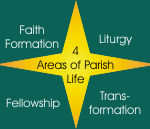

 |
|
 |
|
Homily for July 3rd, 2005.
Caution: Putting a Sunday homily on the Website is tricky business. All the viewer has is a written text. A homily, on the other hand, is "an oral event". It may not have been said or heard the way it was written. In addition, a roughly ten-minute homily is part of a roughly one-hour worship event in which God and God's people communicate with each other by means of ritual, symbol, song, proclamation, prayer. Not everything in these homilies is original. As a homilist, I rely on and at times borrow from other homilists and writers who are not properly mentioned in this format. I am often indebted to them. Father William Marrevee, s.c.j.
14th Sunday Ordinary Time A The Talmud is a collection of Jewish religious literature. It has an interesting comment on the psalm (psalm 145) which we sang after the first reading: “Anyone who recites this psalm three times daily is assured of a place in the world to come.” So it is recited daily in the synagogue for morning, noonday, and evening prayer. What is so special about this psalm? When praying/singing a psalm like this we confess two things: the insufficiency of self and the sovereignty of God. We publicly acknowledge that our lives are not held together by what we can secure for ourselves, but by the gracious, compassionate, faithful love of God. Staying connected to the source of life – God – will bring us to the fulfillment of our deepest longings. That is a hard thing to acknowledge today. It goes against the grain for many today. The prevailing culture of our time feeds us in so many subtle and not so subtle ways self-reliance. Dependence on God is an outmoded attitude. We have to manage our own affairs by asserting our rights, by getting and protecting all that we can possibly acquire; make sure you take good care of yourself. Psalm 145, on the other hand, invites us to yield to God, to live by God’s claim on us, under God’s watchful care, and into God’s promised future. It urges us to acknowledge that, in the final analysis, when it comes to the true fulfillment of our heart’s desires we live by gift, by grace; not by grasp, by control, by what we produce or acquire by ourselves. Things that we can buy or produce ourselves, in the end, don’t cut it. There is a certain innocence about this psalm that we have to be careful with. In some circles it leads people to say “God will take care of everything.” That sort of carelessness is in no way supported by this psalm. The psalm does not absolve us from the responsibilities we have. What the psalm calls for is that in the discharge of our responsibilities we do not lose the basic trust in God, who is faithfully attentive to the creatures God as made. When we praise God we do not abdicate our responsibilities. In our praising God we acknowledge that our lives belong to God and that our futures are secured by God. It is beautifully captured by a real giant in our Christian faith tradition, St. Augustine . He opens his autobiography Confessions with a quote from psalm 145. And then he comments: “Human beings are God’s creation; that is why they cannot experience contentment apart from praising God.” And then he adds in prayer form “God, you made us for yourself and our hearts are restless until they come to rest in you.” It is akin to what another giant of our faith tradition of the 20 th century, Karl Rahner says: “Nothing short of God is good enough for us.” |
|||||
| © Copyright 2025 Our Lady of Victory / St-Malachy Site
490 Charles Street • Gatineau • Quebec • J8L 2K5 Telephone: (819) 986-3763 Website powered by Arvixe Web Hosting |